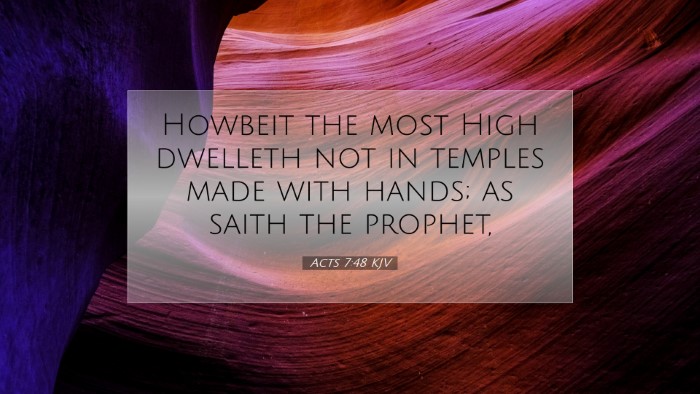Commentary on Acts 7:48
Verse: "Howbeit the most High dwelleth not in temples made with hands; as saith the prophet."
Contextual Overview
In Acts 7:48, Stephen, one of the first deacons and a significant figure in the early church, addresses the Sanhedrin. He is providing a defense against the accusations leveled at him regarding his teachings, particularly about the law and the temple. This verse marks a pivotal moment in his sermon, emphasizing the transcendent nature of God and challenging the centrality of the temple in Jewish worship.
Theological Insights
This statement brings to light several key theological themes that are pertinent to the understanding of God's nature and His relationship with humanity.
The Nature of God
Transcendence: The phrase "the most High" underscores the transcendence of God. He is beyond human understanding and earthly limitations, as noted by Matthew Henry, who emphasizes that God’s essence cannot be confined within man-made structures. His dwelling is not restricted to any physical location.
Critique of the Temple System
Stephen's declaration challenges the Jewish belief that the temple was the exclusive dwelling place of God. Adam Clarke argues that this indicates a significant shift in the understanding of God’s presence; His relationship with humanity is not limited to rituals or locations. He points out that acknowledging God's omnipresence aligns with scriptural prophetic traditions.
Prophetic Foundations
Stephen references the prophets, particularly citing Isaiah (Isaiah 66:1-2), who spoke of heaven as God’s throne and earth as His footstool. Albert Barnes elaborates on this prophetic foundation, emphasizing that God’s essence cannot be contained and that true worship must extend beyond the physicality of the temple.
Historical Context
During this period, the temple held immense significance for Jewish worship. It symbolized God's presence among His people and was the center of sacrificial practices. However, as Henry points out, God's relationship transcends physical constructs and has always intended to extend to all of humanity.
Acts of God Beyond the Temple
This statement not only reflects a historical shift but also asserts that God's actions and presence have always been evident outside the temple's confines. The early church would exemplify this embodiment of faith, where God's work would be manifest through believers, not bound to the walls of a temple.
Practical Implications
For contemporary believers and theologians, Acts 7:48 carries profound implications regarding the nature of worship and community. It suggests that the essence of worship should not be confined to a building or institution.
- Worship that Transcends Space: The understanding that God is present wherever His people gather emphasizes the significance of spiritual community over physical location.
- Emphasis on Relationship: Faith must focus on a personal relationship with God, challenging notions of ritualistic religion.
- Mission and Evangelism: As God is not confined to the temple, this empowers believers to spread the gospel in all spheres of life, reflecting God's reach to all nations.
Conclusion
Acts 7:48 serves as a robust theological assertion regarding God's presence and the nature of true worship. Stephen's words echo a divine truth that continues to resonate with Christians today: that while God is sovereign and uncontainable, He desires a relationship with His creation that transforms the understanding of worship from a physical structure to a living, breathing community of believers.
This text calls upon pastors, theologians, and students of Scripture to reflect on how traditional understandings of worship may need reevaluation in light of God's self-revelation through Christ and the early church's mission.


